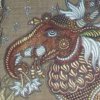 A party of travellers lost their way in a wilderness, and were well
nigh famished with hunger. While they were considering what to do, a sage came
up and condoled with them on their unfortunate plight. He told them that there
were many young elephants in the adjacent woods, one of which would furnish them
an ample meal, but at the same time he warned them that if they killed one, its
parents would in all probability track them out and be revenged on them for
killing their offspring. Shortly after the travellers saw a plump young
elephant, and could not resist killing and eating it. One alone refrained. Then
they lay down to rest; but no sooner were they fast asleep than a huge elephant
made his appearance and proceeded to smell the breath of each one of the
sleepers in turn. Those whom he perceived to have eaten of the young elephant's
flesh he slew without mercy, sparing only the one who had been prudent enough to
abstain.
A party of travellers lost their way in a wilderness, and were well
nigh famished with hunger. While they were considering what to do, a sage came
up and condoled with them on their unfortunate plight. He told them that there
were many young elephants in the adjacent woods, one of which would furnish them
an ample meal, but at the same time he warned them that if they killed one, its
parents would in all probability track them out and be revenged on them for
killing their offspring. Shortly after the travellers saw a plump young
elephant, and could not resist killing and eating it. One alone refrained. Then
they lay down to rest; but no sooner were they fast asleep than a huge elephant
made his appearance and proceeded to smell the breath of each one of the
sleepers in turn. Those whom he perceived to have eaten of the young elephant's
flesh he slew without mercy, sparing only the one who had been prudent enough to
abstain.
O son, the pious are God's children,
Absent or present He is
informed of their state.
Deem Him not absent when they are endangered,
For
He is jealous for their lives.
He saith, "These saints are my
children,
Though remote and alone and away from their Lord.
For their
trial they are orphans and wretched,
Yet in love I am ever holding communion
with them.
Thou art backed by all my protection,
My children are, as it
were, parts of me.
Verily these Dervishes of mine
Are thousands on
thousands, and yet no more than One;
[...]
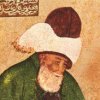 Thou art asleep, and the smell of that forbidden fruit
Thou art asleep, and the smell of that forbidden fruit
Ascends
to the azure skies, -
Ascends along with thy foul breath,
Till it
overpowers heaven with stench; -
Stench of pride, stench of lust, stench of
greed.
All these stink like onions when a man speaks.
Thou thou swearest,
saying, "When have I eaten?
Have I not abstained from onions and
garlic?"
The very breath of that oath tells tales,
As it strikes the
nostrils of them that sit with thee.
So too prayers are made invalid by such
stenches,
That crooked heart is betrayed by its speech,
The answer to that
prayer is, "Be ye driven into hell,"
The staff of repulsion is the reward of
all deceit.
But if thy speech be crooked and thy meaning straight,
Thy
crookedness of words will be accepted by God.
A snake-catcher, who was following his occupation in the mountains, discovered a large snake frozen by the cold, and imagining it to be dead, he tied it up and took it to Baghdad. There all the idlers of the city flocked together to see it, and the snake, thawed by the warmth of the sun, recovered life, and immediately destroyed the spectators.
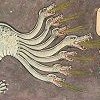 Lust is that snake; How say you it is dead?
Lust is that snake; How say you it is dead?
It is only frozen by
the pangs of winter.
Beware, keep that snake in the frost of
humiliation,
Draw it not forth into the sunshine of Iraq!
So long as that
snake is frozen, it is well;
When it finds release from frost you become its
prey.
Conquer it and save yourself from being conquered,
Pity it not, it
is not one who bears affection.
For that warmth of the sun kindles its
lust,
And that bat of vileness flaps its wings.
Slay it in sacred war and
combat,
Like a valiant man will God requite you with union.
When that man
cherished that snake,
That stubborn brute was happy in the luxury of
warmth;
And of necessity worked destruction, O friend;
Yea, many more
mischiefs than I have told.
If you wish to keep that snake tied up
Without
trouble, be faithful, be faithful!
read a poetic version by Coleman Barks
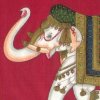 3.5: The Elephant in a Dark Room
3.5: The Elephant in a Dark RoomSome Hindoos were exhibiting an elephant in a dark room, and many people collected to see it. But as the place was too dark to permit them to see the elephant, they all felt it with their hands, to gain an idea of what it was like. One felt its trunk, and declared that the beast resembled a water-pipe; another felt its ear, and said it must be a large fan; another its leg, and thought it must be a pillar; another felt its back, and declared the beast must be like a great throne. According to the part which each felt, he gave a different description of the animal.
read a poetic version by Coleman Barks
The eye of outward sense is as the palm of a hand,
The whole
of the object is not grasped in the palm.
The sea itself is one thing, the
foam another;
Neglect the foam, and regard the sea with your eyes.
Waves
of foam rise from the sea night and day,
You look at the foam ripples and not
the mighty sea.
We, like boats, are tossed hither and thither,
We are
blind though we are on the bright ocean.
Ah! you who are asleep in the boat
of the body,
You see the water; behold the Water of waters!
Under the
water you see there is another Water moving it,
Within the spirit is a Spirit
that calls it.
Keep silence that you may hear Him speaking
Words
unutterable by tongue in speech.
Keep silence, that you may hear from that
Sun
Things inexpressible in books and discourses.
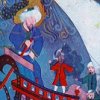 Keep silence, that the Spirit may speak to you;
Keep silence, that the Spirit may speak to you;
Give up swimming
and enter the ark of Noah;
Not like Canaan, when he was swimming,
Who
said, "I desire not to enter the ark of Noah passing by."
Noah cried, "Ho!
child, come into the ark and rest,
That you be not drowned in the flood, O
weak one."
Canaan said, "Nay! I have learned to swim,
I have lit a torch
of my own apart from thy torch."
Noah replied, "Make not light of it, for
'tis the flood of destruction,
Swimming with hands and feet avails naught
to-day.
The wind of wrath and the storm blow out torches;
Except the torch
of God, all are extinguished."
He answered, "Nay! I am going to that high
mountain,
For that will save me from all harm."
Noah cried, "Beware, do
not so, mountains are now as grass;
Except the Friend none can save
thee."
He answered, "Why should I listen to thy advice?
For thou desirest
to make me one of thy flock.
Thy speech is by no means pleasing to me,
I
am free from thee in this world and the next."
Thus the more good advice Noah
gave him,
The more stubborn refusals he returned.
Neither was his father
tired of advising Canaan,
Nor did his advice make any impression on
Canaan;
While they were yet talking a violent wave
Smote Canaan's head,
and he was overwhelmed.
Before you go on to the next section, make sure you can answer the following questions:
Source: Unless otherwise noted, the readings come from Rumi's Masnavi, translated by E. H. Whinfield (online in pdf format at Omphaloskepsis). This version of the text is provided for your printing convenience. Reading comprehension questions have been added after each section.
|
Modern Languages / Anthropology 3043: Folklore &
Myth. |
|